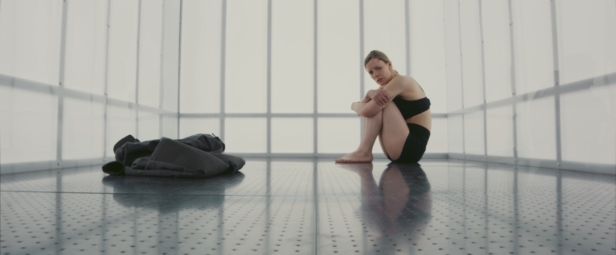“The United Kingdom, Soon”, reads the text that opens White Chamber – and already the film’s ironies and contradictions are setting in. For in this near future, the Kingdom is the opposite of United. Civil war divides the land, with martial law declared by an unelected military council which is trying to quell a popular uprising led by the UK Liberation Army. Both sides are determined, entrenched and desperate.
Following 2016’s Servants’ Quarters, this second feature from writer/director Paul Raschid takes the traditionally epic themes of internecine strife, and confines them to a literal chamber piece. At the beginning a woman (Shauna Macdonald) regains consciousness in a white cuboid room. It is a precisely controlled environment which her captor Citizen General Zakarian (Oded Fehr), the leader of the UKLA, is using to interrogate and torture her for information about this recently overtaken facility. Even though she insists that she is just an ‘admin girl’ and that she has little idea what was going on at the facility, a flashback to five days earlier reveals that the woman had been working on the other side of the chamber, as part of a research team of four – with Ed (Nicholas Farrell), Sandra (Sharon Maughan) and newcomer Ruth (Amrita Acharia) – and making a slightly different (if similarly horrific) use of the chamber’s special features on a captive of their own.
As all the actors are called upon to play double rôles in a film where every character is inevitably conflicted, the effect of all this is to keep turning the tables on our sympathies and to play havoc with our moral orientation. For here tormentor and victim prove interchangeable, everyone (from either side) is both human being and monster, and the most abhorrently reprehensible of actions are undertaken for reasons personal as well as political. “We try to leave our demons outside the facility,” Ed tells Ruth, “but we’re helpless when they chase us in.” The team’s scientific professionalism is constantly undermined by its spirit of bitter vendetta, and all Ruth’s conscientious efforts to raise obvious ethical objections to what is going on are met with the pulling of rank or even with charges of treason. Here war is an activity that sets people at odds with their loved ones as much as their enemies, and the more they objectify and brutalise their foes, the more they also dehumanise themselves.
In other words, although contained almost entirely within the space of an experimental facility, White Chamber cooks up – in microcosm – a challenging crystallisation of the absurdity and addictiveness of war. And coming when the UK is polarised over issues of class, race, sovereignty and Brexit, Raschid’s film could not be more timely.
